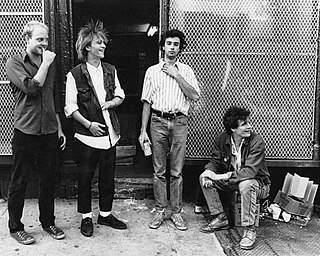
The Replacements were an American rock band formed in Minneapolis, Minnesota, in 1979 after nineteen-year-old Bob Stinson gifted his eleven-year-old brother Tommy Stinson a bass guitar. The band was composed of the guitarist and vocalist Paul Westerberg, guitarist Bob Stinson, bass guitarist Tommy Stinson, and drummer Chris Mars for most of its existence. After two albums in the style of punk rock, they became one of the main pioneers of alternative rock with their acclaimed albums Let It Be and Tim. Bob Stinson was kicked out of the band in 1986, and Slim Dunlap joined as lead guitarist. Steve Foley replaced Mars in 1990. Towards the end of the band's career, Westerberg exerted more control over its creative output. The group disbanded in 1991 and the members eventually found various projects. A reunion was announced on October 3, 2012. Fans affectionately refer to the band as the 'Mats, a nickname which originated as a truncation of "The Placemats".

Paul Frederic Simon is an American singer-songwriter known for his solo work and his collaborations with Art Garfunkel. He and his school friend Garfunkel, whom he met in 1953, came to prominence in the 1960s as Simon & Garfunkel. Their blend of folk and rock, including hits such as "The Sound of Silence", "Mrs. Robinson", "America" and "The Boxer", served as a soundtrack to the counterculture movement. Their final album, Bridge over Troubled Water (1970), is among the bestselling of all time.

James Roger McGuinn is an American musician, best known for being the frontman and leader of the Byrds. He was inducted into the Rock and Roll Hall of Fame for his work with the Byrds. As a solo artist he has released 10 albums and collaborated with, among others, Bob Dylan, Tom Petty and Chris Hillman. The 12-string Rickenbacker guitar is his signature instrument.

Alexandra Elene MacLean Denny was an English singer-songwriter who was lead singer of the British folk rock band Fairport Convention. She has been described as "the pre-eminent British folk rock singer".
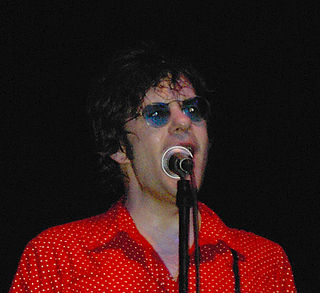
Paul Harold Westerberg is an American musician, best known as the lead singer, guitarist, and songwriter for The Replacements. Following the breakup of The Replacements, Westerberg launched a solo career that saw him release three albums on two major record labels.

Thomas Eugene Stinson is an American rock musician. He came to prominence in the 1980s as the bass guitarist for The Replacements, one of the definitive American alternative rock groups. After their breakup in 1991, Stinson formed Bash & Pop, acting as lead vocalist, guitarist and frontman. In the mid-1990s he was the singer and guitarist for the rock band Perfect, and eventually joined the hard rock band Guns N' Roses in 1998.

Todd Daniel Snider is an American singer-songwriter whose music incorporates elements of folk, rock, blues, alt country, and funk.

Pleased to Meet Me is the fifth studio album by the American rock band the Replacements, released in 1987 by Sire Records. The album was acclaimed by music critics.
Johnette Napolitano is an American musician best known as the lead vocalist, songwriter, and bassist for the alternative rock group Concrete Blonde.
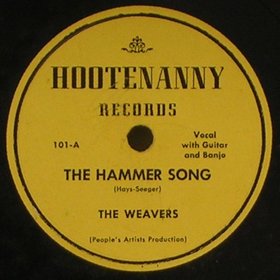
"If I Had a Hammer " is a protest song written by Pete Seeger and Lee Hays. It was written in 1949 in support of the Progressive movement, and was first recorded by the Weavers, a folk music quartet composed of Seeger, Hays, Ronnie Gilbert, and Fred Hellerman. It was a #10 hit for Peter, Paul and Mary in 1962 and then went to #3 a year later when recorded by Trini Lopez in 1963.

All Shook Down is the seventh and final studio album by the American rock band The Replacements, released on September 25, 1990, by Sire Records.

"Jingle Bell Rock" is an American Christmas song first released by Bobby Helms in 1957. It has received frequent airplay in the United States during every Christmas season since then, and is generally considered Helms' signature song. "Jingle Bell Rock" was composed by Joseph Carleton Beal and James Ross Boothe, although both Helms and session guitarist on the song Hank Garland disputed this. Beal was a Massachusetts-born public relations professional and longtime resident of South Ocean Avenue in Atlantic City, New Jersey, and Boothe was an American writer in the advertising business.

"I Will Dare" is a song by American alternative rock band The Replacements, written by Paul Westerberg. The song's pop stylings were a departure from the band's punk origins and its lyrics reflected the band's willingness to "dare to do anything." The track also features guitar performed by Peter Buck of R.E.M.

14 Songs is the first solo album by the American musician Paul Westerberg, released in 1993. It followed the final Replacements album, All Shook Down, and the dissolution of the band.

Stereo is the fourth solo album by Paul Westerberg. At this point in his career, the former Replacements leader was entering a new phase. He said goodbye to professional studios and big-name producers like Brendan O'Brien and Don Was, recording the album in his basement by himself. As detailed in the liner notes, Westerberg made no effort to fix imperfections, and even included a song for which the tape ran out before it was over. Stereo was packaged with Mono, which he credited to his Grandpaboy alter ego. Vagrant Records also had a limited release of Mono as a separate album.
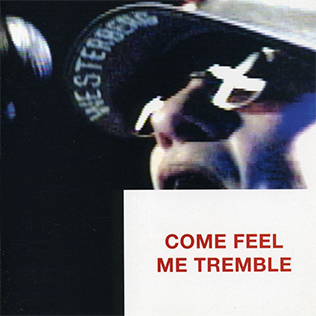
Come Feel Me Tremble is Paul Westerberg's fifth solo album. Like its predecessor, it is a rough collection of songs that Westerberg recorded by himself in his home.
Nevada were a British folk/progressive rock band and a spin-off from Renaissance, featuring Annie Haslam on vocals and Mick Dunford on guitar. Their Christmas single, "In the Bleak Midwinter", reached the lower edges of the UK singles chart in 1983.
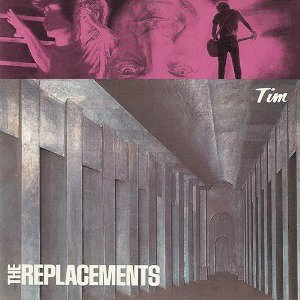
Tim is the fourth studio album by American alternative rock band The Replacements. It was released in September 1985 on Sire Records. It was their first major label release and also the last album made by the original line-up of the band: guitarist Bob Stinson was kicked out of the band towards the end of 1986.

Brian Fallon is an American musician, singer and songwriter. He is best known as the lead vocalist, rhythm guitarist, and main lyricist of the rock band the Gaslight Anthem, with whom he has recorded six studio albums. He was also a member of the duo the Horrible Crowes, alongside the Gaslight Anthem's guitar technician and touring guitarist Ian Perkins. Since 2016, Fallon has released four solo albums and one EP.

From A Room: Volume 1 is the second studio album by American singer-songwriter Chris Stapleton, released on May 5, 2017 through Mercury Nashville. Primarily a country, blues, and roots rock record, it was produced by Dave Cobb and Stapleton.


















